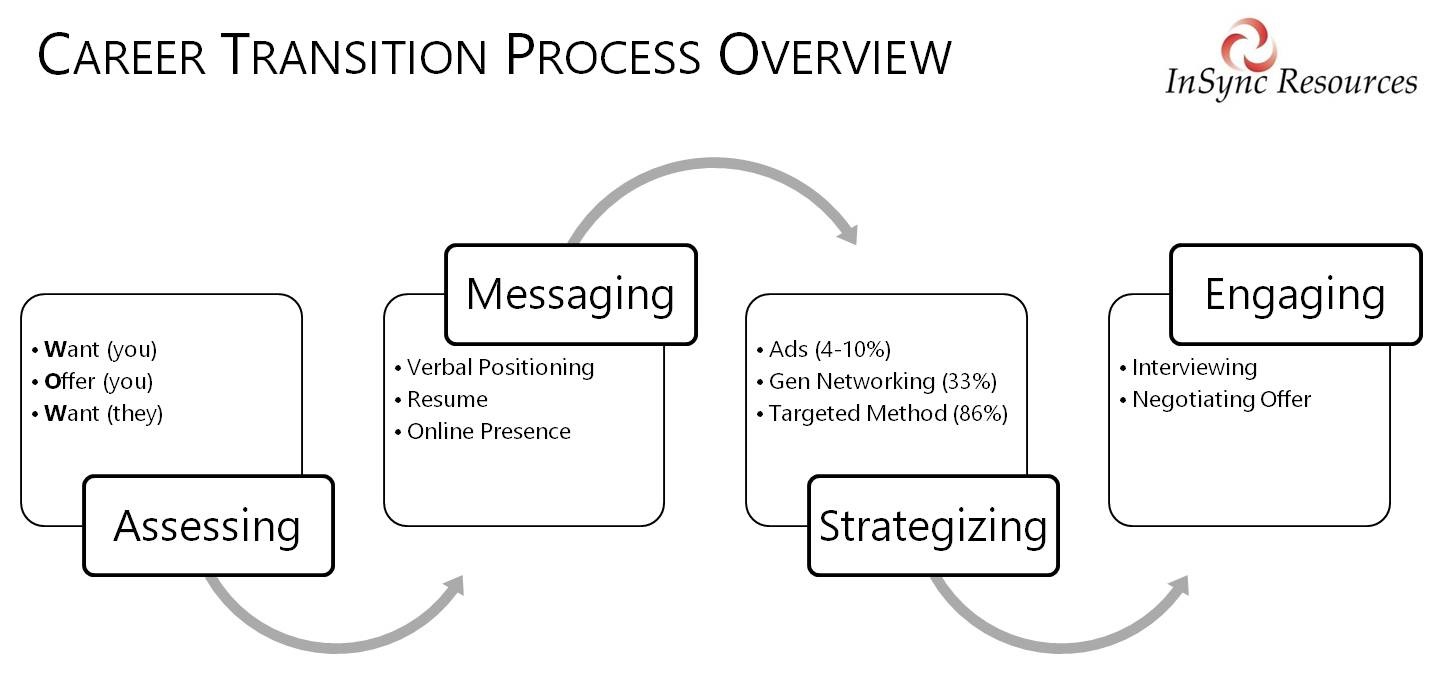How To Deal With Job Search Ambiguity

Job search can be so ambiguous. Outcomes (and the lack of outcomes) are often driven by the unpredictability of human behavior during a job search. Technology seems to direct resumes toward a sort of digital black hole more often than not. People won’t email you back, and you can only guess at what may be happening behind the scenes when dealing with nonresponsive recruiters.
But here’s what my work with professionals in career transition has taught me… You can either see yourself as powerless and at the whim of this ambiguity, or you can see yourself as empowered and emboldened by the things you CAN control in your job search. And the best way to put some power back into your hands is to treat your job search as a process. Recruiters and hiring managers have a hiring process. Why can’t you have a job search process?

True, you may not know how long the process will take and how long you may have to linger in one stage or another of the process. But you may be surprised by just how much of it is under your control.
Through many years of observation, I’ve come to realize there are 4 main stages in the typical job search process. They are Assessing, Messaging, Strategizing, and Engaging. I’ve created a visual model that summarizes the phases and what generally needs to occur in each phase. See below.

Stage 1: Assessing
In this stage, you need to determine your W-O-W Point – it’s a convergence point where the answer to three key questions come together.
 Want – what do you want?
Want – what do you want?
Offer – what do you offer?
Want – what do they want?
Of course, you know how much money you want, the benefits you want, etc. You may have a lot of general thoughts, but this stage in the process is about getting specific. (Read: The Ideal Factors Exercise)
The “what you offer” question isn’t just about the biography of what you’ve done in your career. It’s about what you’ve done that you’d like to keep doing. And it’s about how you get results doing it. (Read my 3-part article series for tips on how to determine this for yourself: Cultivating Your Individual Brand)
The “what they want” question is about recognizing what you offer that your target market will want from you. It’s about understanding how you align yourself with what’s important to potential employers while also keeping in mind what is important to you.
Once you’ve answered these key questions, you’ll prepare yourself well for the rest of the process. You’ll know how to package your skills and talents so that you attract the right position. You’ll be able to articulate clearly what you’re looking for when your friend offers to help. You’ll know how to confidently answer the question “why do you want to work for us?” You might even find it useful when negotiating an offer.
You already know it’s a good idea to do your homework in researching a company before interviewing with them, but I urge you to do the homework of researching yourself as well. Don’t skip this stage.
Stage 2: Messaging
If you’ve just realized after reading the above that you’ve skipped the first stage, you’re not alone. Most people start with stage two because it seems logical to start a job search by updating or creating a resume, but that often leads to mistakenly attributing a lack of results to the resume. It very well could be that the resume is to blame or even some other part of the process. However, I know from experience that starting with the assessing stage will help tremendously in fine tuning a resume with the best messaging possible.
 By the way, I’m using the term “messaging” here just like they use the term in the marketing field. Marketers create messaging to let potential buyers know about the organization and the value it provides. Your resume is your marketing brochure. It needs to have the right message about you and the value you provide.
By the way, I’m using the term “messaging” here just like they use the term in the marketing field. Marketers create messaging to let potential buyers know about the organization and the value it provides. Your resume is your marketing brochure. It needs to have the right message about you and the value you provide.
Your messaging isn’t just about what you say on your resume. If you use social media and have any profiles out there online, especially on LinkedIn, that’s part of your messaging too. There’s also what we call “verbal positioning” (another marketing term). This refers to how you talk about yourself when discussing your job search with friends, family, former colleagues, and potential employers. Besides talking about the value you provide, your messaging also includes why you’re looking and what you want in a job. Your messaging needs to be clear and understandable so they can see right away how they might be able to help you… or hire you.
Stage 3: Strategizing
Here we come to an especially ambiguous part of the process. It can be frustrating when what seems like the most obvious strategy to uncover job opportunities, answering online ads, is actually the least effective of the strategies you will attempt. The truth is that running a job ad yields great results for an organization that is hiring, but the odds of being the one person who makes it through the hiring funnel to get the offer are low. Dan Miller, author of 48 Days to the Work You Love, says that “if you just send cover letters and resumes, you need to send out 254 to have a statistical chance of getting a job offer.” However, there are ways to make this necessary strategy more effective. Miller adds, “If you combine that with a phone call, the number drops to 1 out of 15.”
 I advise my clients to use 3 or 4 strategies. The two most effective are general networking and targeting companies (Dan Miller briefly outlines the targeting method in his article: You’re Fired No Hired), which also entails networking as one of the steps but in a certain way. Another strategy might involve working with third-party recruiters (my former profession) when it makes sense for the desired position and industry.
I advise my clients to use 3 or 4 strategies. The two most effective are general networking and targeting companies (Dan Miller briefly outlines the targeting method in his article: You’re Fired No Hired), which also entails networking as one of the steps but in a certain way. Another strategy might involve working with third-party recruiters (my former profession) when it makes sense for the desired position and industry.
Basically, what you see in this stage is that there’s more than one strategy at your disposal. Also, you realize that you can empower yourself and reduce job search ambiguity by doing things that statistically work well.
Stage 4: Engaging
 This is the stage where you get the interviews and reach the goal of receiving and accepting a stellar offer for a fantastic new job. Interviewing is probably the most ambiguous of all the parts in the process. Especially when you get called for a phone screen or invited in to interview in person and then everyone goes silent. Should you follow up? If you do follow up, how soon is too soon, how frequently is too frequently. You don’t want to come across as desperate. When you’re excited about what seems like a well-matched opportunity, it’s hard to let go of your expectations. You’re hoping for a certain outcome.
This is the stage where you get the interviews and reach the goal of receiving and accepting a stellar offer for a fantastic new job. Interviewing is probably the most ambiguous of all the parts in the process. Especially when you get called for a phone screen or invited in to interview in person and then everyone goes silent. Should you follow up? If you do follow up, how soon is too soon, how frequently is too frequently. You don’t want to come across as desperate. When you’re excited about what seems like a well-matched opportunity, it’s hard to let go of your expectations. You’re hoping for a certain outcome.
It’s true that there’s very little you can do to ensure you’ll get an offer. However, I’ve chosen the phrase “very little you can do” on purpose because there still are a few things you can try that are within your control. Things like what you ask during the interview, how you set the stage before the interview is over for your follow up activities post interview, and sending well-composed, thoughtful thank you notes within 24 hours.
Focus On What You Can Control
Maybe your value proposition is a little murky or your verbal positioning is a bit off and could use some refining. Maybe your search strategy needs to be tweaked, especially if you’re only focused on answering online job postings. Maybe your resume needs some buffing up. Or maybe your resume is working just fine because you’re getting  interviews, but you’re not getting any offers so it’s your interviewing skills that could be improved. There are a myriad of reasons why things can break down in each stage of the process.
interviews, but you’re not getting any offers so it’s your interviewing skills that could be improved. There are a myriad of reasons why things can break down in each stage of the process.
If you’re not having the results you thought you’d have by now with your job search, it can be pretty tempting to drop into a negative downward spiral with your outlook. And dealing with a lot of ambiguity isn’t what many of us would consider fun. But the best antidote for all that is to treat your job search as a process and to really pour your focus into what you can control instead of only focusing on what you cannot.
__________________________________________________________
Angela Loeb is into self-development & personal empowerment, being awed by nature, writing, and being inspired by superhero stories. She’s also a career expert who’s advised job seekers for more than two decades.
http://angelaloeb.com



